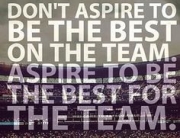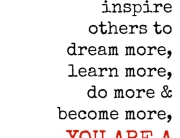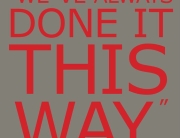 Familiar wisdom is often ignored. My son plays Pop Warner football and he is a running back. I recall being at a game where I noticed that he was not using his straight-arm to avoid being tackled. His actions resulted in not performing at his full potential. My son and I have a great relationship but sometimes my advice falls on deaf ears. In his mind, my advice would be considered familiar wisdom because he’s thinking, Dad says, “use your straight-arm”, all of the time. So I decided to take a better approach. I relayed my message through one of my son’s coaches. I discreetly pulled Coach Frank to the side and said, “Frank, my son is not using his straight-arm, tell him to go all out!” Frank agreed and relayed the message to my son. During the next series of plays my son straight armed the defender to the turf and ran for a nice gain. As the play ends, my son hustles over to the fence and emphatically says, “Dad, did you see that straight-arm?” He gives me two thumbs up as he runs back towards the huddle. Coach Frank glances in my direction and chuckles. Based on past experiences and my son’s stubbornness (must be genetic) he may have ignored the advice if it came from me. However, ignoring the nugget of wisdom would not only hurt my son but also the team. When do we ignore familiar wisdom? Do we have people who are close to us that have a wealth of wisdom to share but we ignore them on a daily basis? As the leader, have you ever abruptly shut down a team member’s idea without review? Do we have people in our circles that we take for granted? It is time to take an inventory of the knowledge base that is already in our midst.
Familiar wisdom is often ignored. My son plays Pop Warner football and he is a running back. I recall being at a game where I noticed that he was not using his straight-arm to avoid being tackled. His actions resulted in not performing at his full potential. My son and I have a great relationship but sometimes my advice falls on deaf ears. In his mind, my advice would be considered familiar wisdom because he’s thinking, Dad says, “use your straight-arm”, all of the time. So I decided to take a better approach. I relayed my message through one of my son’s coaches. I discreetly pulled Coach Frank to the side and said, “Frank, my son is not using his straight-arm, tell him to go all out!” Frank agreed and relayed the message to my son. During the next series of plays my son straight armed the defender to the turf and ran for a nice gain. As the play ends, my son hustles over to the fence and emphatically says, “Dad, did you see that straight-arm?” He gives me two thumbs up as he runs back towards the huddle. Coach Frank glances in my direction and chuckles. Based on past experiences and my son’s stubbornness (must be genetic) he may have ignored the advice if it came from me. However, ignoring the nugget of wisdom would not only hurt my son but also the team. When do we ignore familiar wisdom? Do we have people who are close to us that have a wealth of wisdom to share but we ignore them on a daily basis? As the leader, have you ever abruptly shut down a team member’s idea without review? Do we have people in our circles that we take for granted? It is time to take an inventory of the knowledge base that is already in our midst.
It is unwise to be too sure of one’s own wisdom. It is healthy to be reminded that the strongest might weaken and the wisest might err. -Gandhi







Leave A Comment